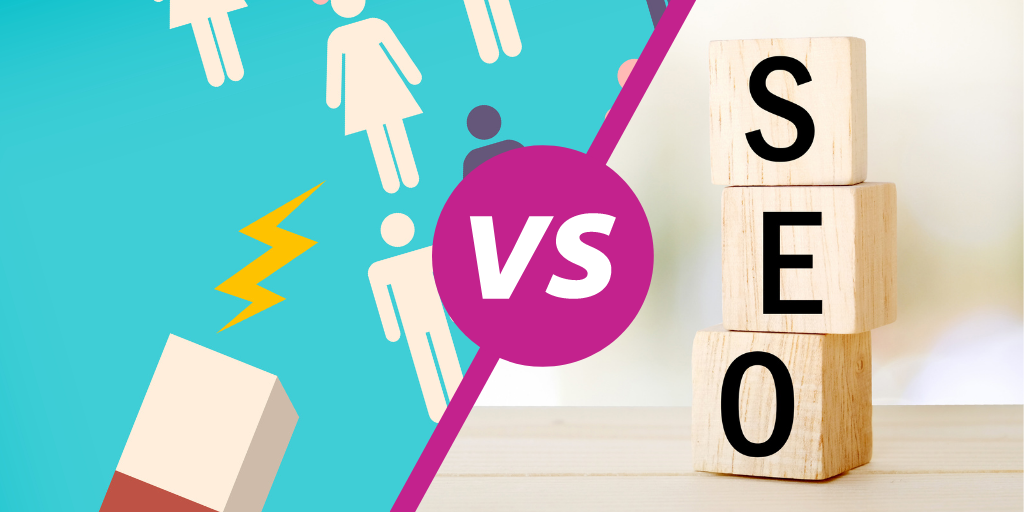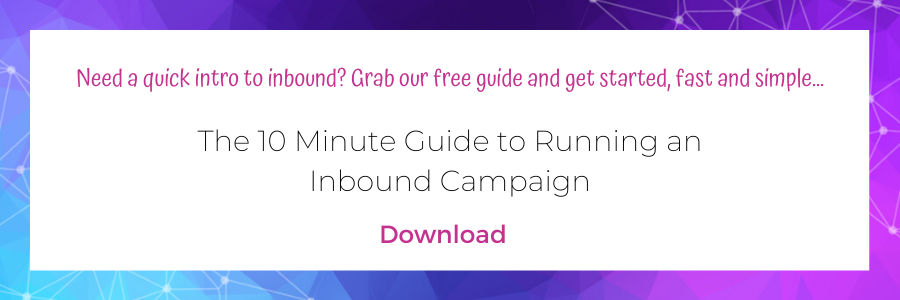This is a great question, and it comes up a lot. Whenever there's something new (although inbound has been around long enough to not quite be considered 'new' anymore), the question is always whether or not it's a real thing or just a buzzword, a repackaging of something else we've all been doing anyway.
So, let's look at both SEO and Inbound marketing and see if they're the same (spoiler: not quite), and how they might fit together as part of your digital marketing strategy.
What is Inbound marketing?
The term "inbound marketing" was designed to differentiate it from "interruptive marketing" - or the type of marketing where you interrupt your audience to get their attention, for example through advertising.
Inbound is a way to attract customers and prospects to you, rather than you having to go to them, by creating content that solves the problems they have. The methodology is "Attract, Engage, Delight".
The key focus of this methodology is creating content - content that attracts and engages people who are looking for solutions. They might be in the research (or awareness) stage, and if you have the content they need, then you've got their attention.
Inbound tactics include:
- Blogging
- Content creation - ebooks, white papers, etc
- Video content
- Social media
- Email marketing
- Marketing automation
- Chatbots
- Landing pages
- and a LOT more
When you attract visitors to your website, you want to move them down the funnel towards the consideration and decision stages of the buying process, so CTAs (calls to action) are another key element of inbound - you want to make it as simple as possible for people to move to the next stage, get the next piece of the puzzle, or select themselves out of the process.
At its heart, inbound is about giving your target audience what they need, when they're looking for it - so you're focused on the right traffic.
What is SEO?
SEO stands for Search Engine Optimisation. Simply, it's a digital strategy that focuses on optimising your website content based on search algorithms, to rank higher on search engine results pages (or SERPs).
People clicking on your content on SERPs creates organic visitors to your website. SEO is about increasing the number of organic visitors through getting your content higher up the SERPs - the most clicks go to the first couple of results on the first page of search results.
SEO covers a variety of different areas - sometimes split into On-page and Off-page, and sometimes as Content and Technical.
On-page
- Content - things like relevant keywords, authority of message, quality of the content and how well it answers the search query, how aligned it is to user intent
- Website structure - the architecture of your website is part of SEO, and includes things like mobile friendliness, security, loading speed
- Meta data - things like page titles and descriptions, title tags and keywords. These are no longer a strong ranking factor but they influence whether or not someone clicks on your content (and click through rate from SERPs does affect rankings)
Off-page
- Links - how many sites link to your site? How authoritative are they?
- Context - is your site relevant to this specific searcher, based on their geography or user intent?
- Authority - how trustworthy the search engine believes your site to be
There's plenty more to SEO, and a lot of different strategies to improve the items above, but essentially the aim is to make your website show up more often, and higher, in search engine results to get more organic traffic.
You'll find that content is a key element of effective SEO, which is why there's often the question about whether or not it's part of inbound (because inbound is all about content). And while it's possible to focus on the non-content side of SEO, it won't have as much effect and it won't give you opportunities to convert any additional traffic into leads and customers.
Is SEO part of inbound?
SEO is part of the attracting phase - any good inbound strategy will need at least some level of optimisation to make sure your website is in a good position. Otherwise, all the hard work you put into creating content will have far less effect than it should. Social media alone will not make up for not having organic traffic.
With the content you're creating, you need to be creating it with SEO principles in mind - there's no point having a shiny new landing page if it's hidden from sight, or a blog post with no meta title.
So yes, you could say that SEO is a feature of the first part of inbound marketing. You create the inbound content and use SEO to make sure it's getting seen. Inbound is the strategy, SEO is one of the tactics.
Inbound then takes things further to engage and delight your audience and move them through the marketing and sales funnel. It also makes sure the content you're creating is strategic and aimed at your ideal customer, not stuffed with keywords to get the highest number of visitors. You want qualified leads, not junk traffic.
Can you do one without the other?
Technically you can choose to do just SEO or just inbound, but in practice it doesn't quite work like that.
As we've mentioned above, if you want to do effective inbound marketing, you'll need your SEO to be working. If your site doesn't get any traffic because you're not using keywords, or your loading times are too long, or your site has no authority, for example, your content isn't going to be found as easily.
And that means that your inbound efforts will be limited. You won't attract as much inbound traffic, which means you won't be able to build an email marketing list, and so on.
If you want to do SEO without inbound, you can. The point of SEO is to increase your organic traffic, so some of what you're doing will cross over with inbound marketing, because both are predicated on generating incoming leads. But if you want to do just technical SEO, it's possible to do it in isolation. It just won't give you as much traffic as combining it with content SEO would.
And then if you want your traffic to convert (which is usually the point, otherwise why do it?) then you'll need conversion paths on your website, you'll need content to attract and engage your audience, and you're pretty close to be doing some inbound anyway.
Which is better, SEO or inbound?
As you can probably tell from all the questions above, that's not really a straightforward answer - they go together like fish and chips, salt and vinegar, and other things that come in pairs.
But, if you really want to break it down to a super simple "which is better" question, well, the answer still depends on what you want to achieve...
Best for generating higher traffic numbers: SEO
Best for improving your page rankings in Google: SEO
Best for generating leads: Inbound
Best for attracting qualified traffic: Inbound
Best all-rounder: Inbound (because it includes SEO)
Do you need a separate Inbound agency and SEO agency?
If you're working with a good inbound agency then no, you shouldn't need a separate SEO agency - because, as we've discovered above, SEO is a tactic used within inbound marketing. So, all of that should be covered in the work your inbound agency does for you.
That said, there are some inbound agencies that focus more on things like Account Based Marketing (where you send direct outreach to highly targeted people, with super relevant content), or look more to the creative and strategic side, rather than getting involved in the tactical elements. In those cases, you should check whether or not they handle your SEO as part of the engagement.
If you have an SEO agency that doesn't do inbound, then you might get some elements of an inbound strategy - particularly if they're doing content for you - but it will most likely be heavily influenced by SEO rather than inbound. That means that while you'll be generating content, it might not be as focused on the audience but instead be focused on search queries indiscriminately, to achieve traffic targets.
There are some fantastic SEO agencies that generate incredible results for their clients, but if inbound specifically is something you want to pursue, then your best bet is going to be working with an inbound agency rather than hoping an SEO agency can provide that.



